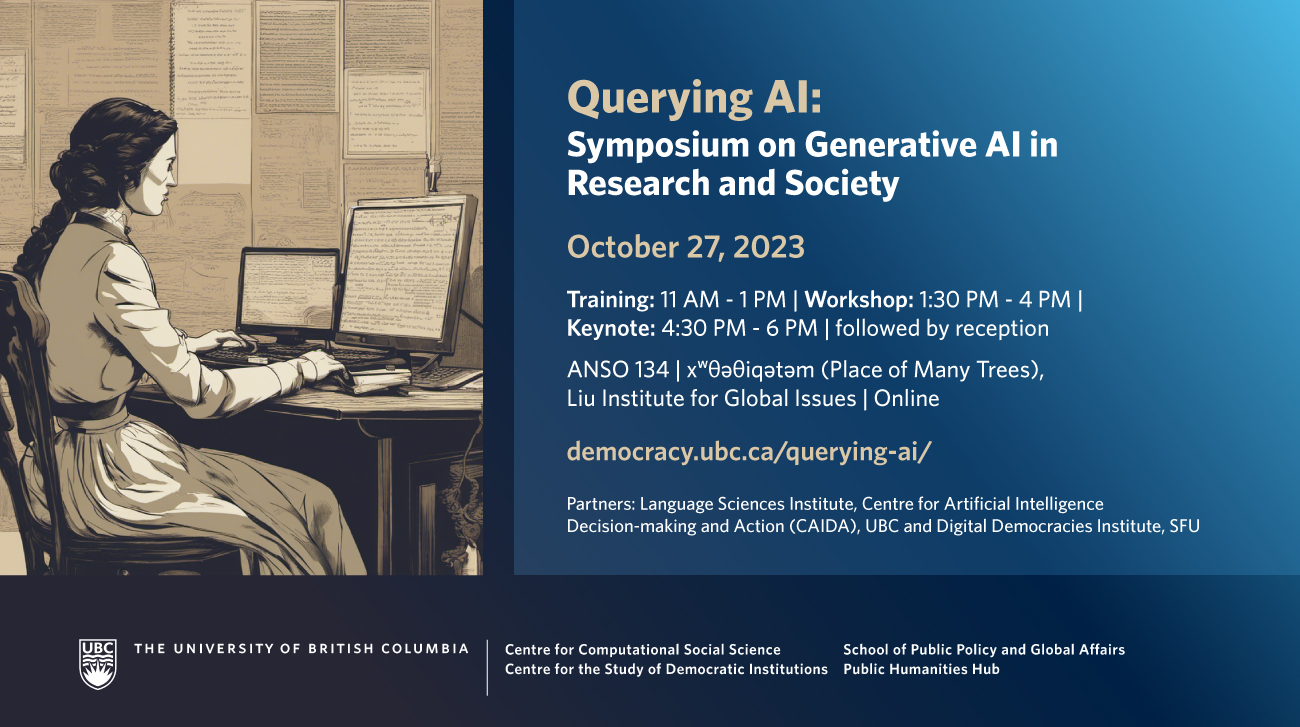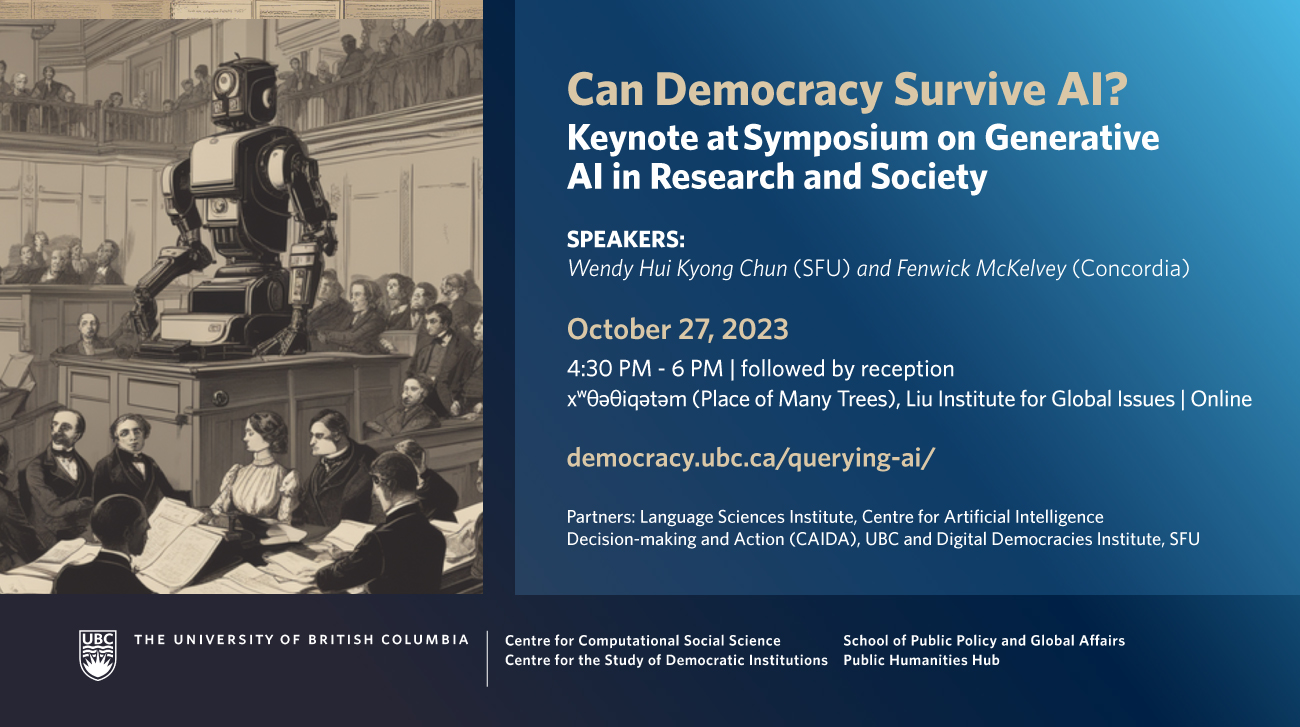General Event
Querying AI: Social Science and Humanities Perspectives on AI in Research and Politics

DATE: Fri, October 27, 2023 - 11:00 am
LOCATION: The xʷθəθiqətəm or Place of Many Trees, Liu Institute for Global issues: 6476 Northwest Marine Drive Vancouver, BC V6T 1Z2
DETAILS
REGISTER HERE
Pre-Workshop Training
Working with AI for Humanities and Social Science Research: Python and R for Word Embeddings and Language Models
Time: 11:00AM - 12:45PM
Venue: ANSO 134
This hands-on workshop will walk participants through using Python and R to train and explore word embeddings, one of the technologies behind large language models and generative AI. The goal of this workshop is to demystify some of the technical aspects of language models and to invite learners to start thinking about how these important tools are used in research and how they function in society. The primary corpus we will use consists of the 150 English-language novels made available by the .txtLab at McGill University, along with a supplemental model trained on the ECCO-TCP corpus of 2,350 eighteenth-century literary texts made available by Ryan Heuser. Participants will learn the conceptual basics of word embeddings, natural language processing, and language models, and how to implement a basic word embedding model to analyze gender stereotypes in 18th and 19th century literature. Some familiarity in R and/or Python is necessary to actively follow the tutorial, but participants who do not know R or Python will be able to follow along conceptually if desired.
Facilitator
Workshop
Session 1: How Can Humanities and Social Science Researchers Use Generative AI?
Time: 1:30PM - 2:30 PM
Venue: The xʷθəθiqətəm or Place of Many Trees, Liu Institute for Global issues
The recent popularity of Generative AI is new, but the technologies behind these methods have been around for decades, and have long been used by social scientists and humanists for research and scholarship. This panel will briefly introduce three perspectives on using language models in social science and humanities research: a sociological perspective on measuring shared stereotypes in language, a political science perspective on using language models to simulate human samples, and a computer science perspective on how computers can improve our own scholarly productivity. We will then invite participants to share how they’re using these methods (or want to use them!) in their own research and what they would need (e.g., skills, infrastructure) to achieve their goals. No prior knowledge is required to join this discussion. We only ask participants to come with an open, curious mind and with their probing questions.
Panelists:
-
Ethan Busby (Assistant Professor of Political Science, Brigham Young University)
Dongwook Yoon (Associate Professor at the Department of Computer Science, UBC)
Laura Nelson (Director of the Centre for Computational Social Science, Assistant Professor of Sociology, UBC).
Session 2: Dilemmas of Using Generative AI in the Academy
Time: 2:45PM - 4:00PM
Venue: The xʷθəθiqətəm or Place of Many Trees, Liu Institute for Global issues
Generative AI introduces both opportunities and dilemmas for researchers and universities. What legal issues arise from using AI models trained on data that is often acquired without permission or compensation, possibly violating intellectual property rights? Can universities and scholars help push back the current political economy of AI, which advances private interests over public goods? How can AI systems be developed or critiqued in order to redress systemic marginalization and promote equity, inclusion and human rights? This session will tackle these and other questions, through insights from panelists with backgrounds in intellectual property law, large language models for African languages, and digital technologies in literature and teaching.
Panelists:
-
Ife Adebara (PhD candidate, Department of Linguistics, UBC)
Laurie McNeill (Associate Dean, Students; Professor of Teaching, Department of English Language and Literatures, UBC)
Graham Reynolds (Associate Dean, Research and International; Associate Professor, Peter A. Allard School of Law, UBC)
Chris Tenove (Interim Director, Centre for the Study of Democratic Institutions; Research Associate and Instructor, School of Public Policy & Global Affairs, UBC)
Keynote Public Event
Can Democracy Survive AI?
Time: 4:30PM - 6:00 PM (Followed by Reception)
Venue: The xʷθəθiqətəm or Place of Many Trees, Liu Institute for Global issues
Recent progress in artificial intelligence has inspired fascination but also provoked panic. There are serious concerns that AI systems will greatly exacerbate the toxicity of our information systems, inequity of our economies, surveillance of our private lives, and polarization of our societies. How might we understand and address these risks? Join Wendy Hui Kyong Chun and Fenwick McKelvey, two of Canada’s leading scholars of digital technology and politics, to discuss what researchers, policymakers and citizens can do to help ensure that democracy survives AI.
Panelists:
-
Wendy Hui Kyong Chun (Canada 150 Research Chair in New Media; Director of the Digital Democracies Institute; Professor in the School of Communication, and Simon Fraser University)
Fenwick McKelvey (Co-Director of the Applied AI Institute; Associate Professor in Information and Communication Technology Policy, Concordia University)
Moderator: Chris Tenove (Interim Director, Centre for the Study of Democratic Institutions, UBC)
REGISTER HERE

Organizers:
Centre for the Study of Democratic Institutions (CSDI), UBC
Centre for Computational Social Sciences (CCSS), UBC
Partners:
Language Sciences Institute, UBC
Centre for Artificial Intelligence Decision-Making and Action (CAIDA), UBC
Digital Democracies Institute (DDI), SFU